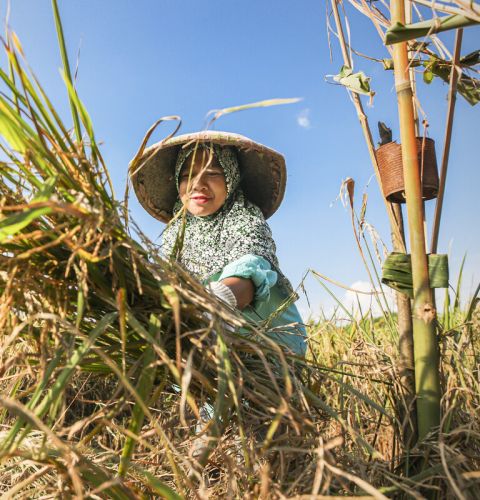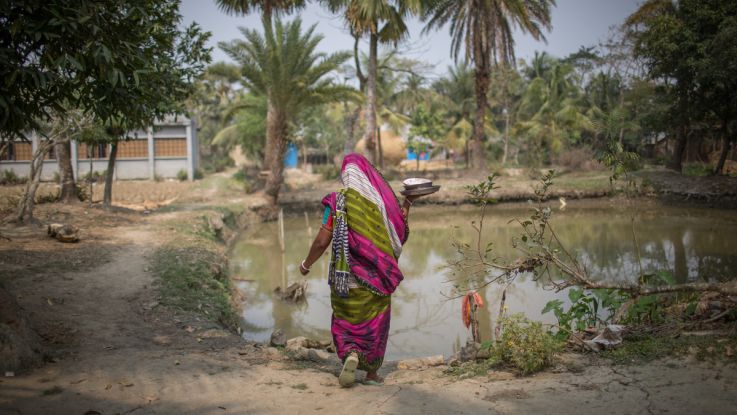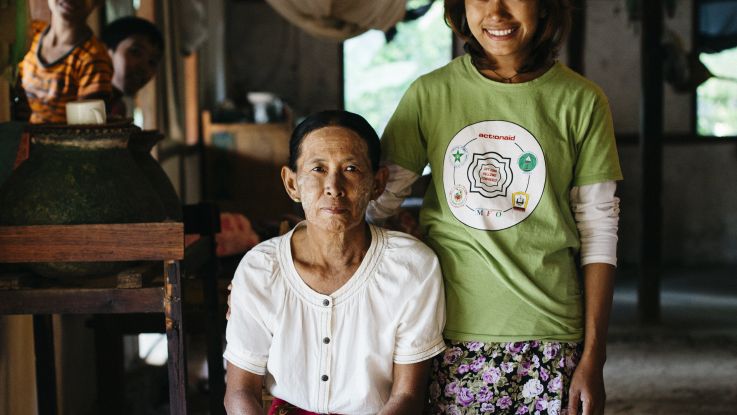Indonesia
Why we work in Indonesia
Inequalities around women’s rights, risks to children attending school, and disasters like tsunamis are some of the issues facing communities in Indonesia.
Unsafe schools
Nearly 5 million primary school children are studying in dilapidated schools4. One in six classrooms in these schools is in some form of disrepair, forcing children to study in unsafe environments. This can include crumbling building foundations, missing floorboards and leaking roofs.
Gender inequality
Discrimination and inequality between the sexes mean that women and girls struggle to make their voices heard and face challenges taking part in civil society.
The Covid-19 pandemic has exposed further gender inequalities in Indonesia. Rates of domestic violence against women increased during country-wide lockdowns and two long-awaited pieces of legislation - a sexual violence prevention bill and a domestic worker protection bill - were put on the hold during the pandemic.5
Disasters
Indonesia has faced a series of earthquakes and tsunamis. One of the more destructive disasters of recent history, the 2004 Indian Ocean earthquake and tsunami, hit several Asian countries including Indonesia and resulted in over 100,000 deaths.
Most recently, an earthquake of 7.4 magnitude struck the central province of Sulawesi in Indonesia, killing over 4,000 people and leaving hundreds of thousands of survivors without food, water or shelter.
Indonesia is part of the Pacific Ring of Fire, with 130 active volcanoes and a high likelihood of volcanic eruptions. It has suffered severe eruptions in the past, resulting in fatalities and damage to the environment.
What we do in Indonesia
Supporting the building of safe schools
Our safe schools programme in Indonesia ensures schools are built to code and that they provide a secure and stable environment for students.
ActionAid-YAPPIKA supports local communities to lobby their local governments to allocate a budget for school repairs. We also train schools and their neighbouring communities to improve their technical knowledge, so that they can play an informed and active role in the renovation of their schools.
In recent years, 27 schools have been repaired with funds and support from the government along with donations. ActionAid plans to renovate over 1,300 classrooms and to empower 82 other school communities so that 17,000 primary school children can attend school safely.
Tackling gender inequality
The Covid-19 pandemic exacerbated existing gender inequality in Indonesia. Unpaid care work and domestic violence cases have increased, and access to health, education and support have been hampered.6
We work with women's groups and other civil society organisations to raise awareness about gender inequality in 50 districts.
We train women in leadership skills and strengthen their ability to influence public policy. We also help strengthen local networks so they can share knowledge and campaign for access and better services for women.
Responding to and building resilience to disasters
Our local staff provided immediate humanitarian relief during the Indonesian earthquake and tsunami of 2018.
In the immediate aftermath of the disaster, we reached out to 60,000 people with emergency aid including tents, tarpaulins, blankets to shelter families who lost their homes, and essentials like food, water, clothing, and nappies.
We set up public, community kitchens in the worst-hit areas to provide hot food for thousands of people a day and opened three women-friendly spaces for women to meet and identify their needs.
We support women groups to develop skills to pursue income-generating activities such as fishing, food processing, and marketing to help women earn income to meet basic needs.
We also provide long-term support to help rebuild communities and strengthen their resilience to future disasters:
- We help increase community resilience by helping them recover from the impact of humanitarian disasters.
- We help establish community-owned disaster preparedness plans. We ensure that aid and disaster prevention programs are women-led as they know their communities best.
- We provide support for communities to campaign and advocate for reducing disaster risk with their governments.
- We conduct research and provide evidence of community involvement to influence national policies in disaster management.
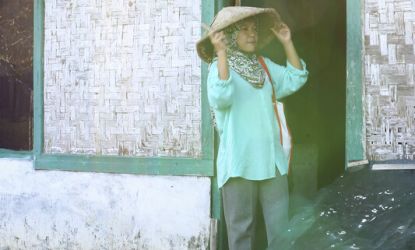
Ade’s fight for climate resilience and safer futures
Ade Herlina, 31, is a farmer and mother of two in Tamanjaya Village, Banten Province. Alongside her husband, she depends on rain-fed agriculture to feed her family.
But erratic weather has made farming increasingly uncertain. “It’s already June and we are just about to harvest. After this, we don’t know if we can plant again because there is no irrigation,” she explains.
Where she once harvested 15 sacks of rice, she now gathers just seven. Pests, disease and rising costs mean harvests no longer cover expenses. A survivor of the 2018 tsunami, Ade also pushed for a community evacuation route, built in 2022, helping ensure families are safer and better prepared for future disasters.
Read about our work on climate changeOur concern as farmers today is the uncertain climate..at least now we are better prepared in the event of a disaster."
Ade, 31, is a farmer and mother of two in Indonesia fighting climate change.
Bima Artoko/ActionAid
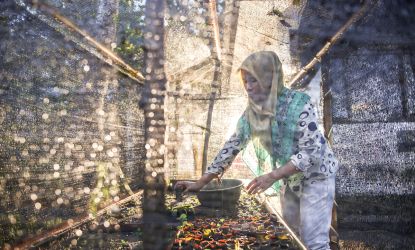
Nur helps lead the community Education Garden to strengthen food security and reduce economic pressures
Bima Artoko/Indonesia
Nur’s strength after the tsunami
Nur, 42, is a survivor of the 2018 Sunda Strait tsunami in Pandeglang, Banten Province. The disaster destroyed half of her home and swept away its contents. That same night, she learned that her husband had another wife in a neighbouring village. Choosing to prioritise her children’s shelter, Nur endured the betrayal until the house was repaired.
After officially separating, she briefly worked as a domestic worker in the city but returned home after four months because she could not leave her children alone. With support from the government’s Hope Family Programme (PKH) and through participating in trainings and women’s empowerment activities, Nur rebuilt her life.
Now active in the Paniis Village Women’s Association, she supports survivors of domestic violence and helps lead the community Education Garden to strengthen food security and reduce economic pressures. “Now I’m happy,” she says.
Read more about our response to the Indonesian tsunamiFootnotes
- 1 https://www.unfpa.org/news/new-survey-shows-violence-against-women-widespread-indonesia
- 2 https://www.oxfam.org/en/inequality-indonesia-millions-kept-poverty
- 3 https://www.girlsnotbrides.org/learning-resources/child-marriage-atlas/atlas/indonesia
- 4https://www.actionaid.ch/app/uploads/2019/09/Case-for-support_SafeSchool_eng.pdf
- 5https://www.hrw.org/world-report/2021/country-chapters/indonesia#d91ede
- 6https://theconversation.com/indonesias-rise-in-domestic-violence-during-the-covid-19-pandemic-why-it-happens-and-how-to-seek-help-142032
Page updated 11 February 2026
